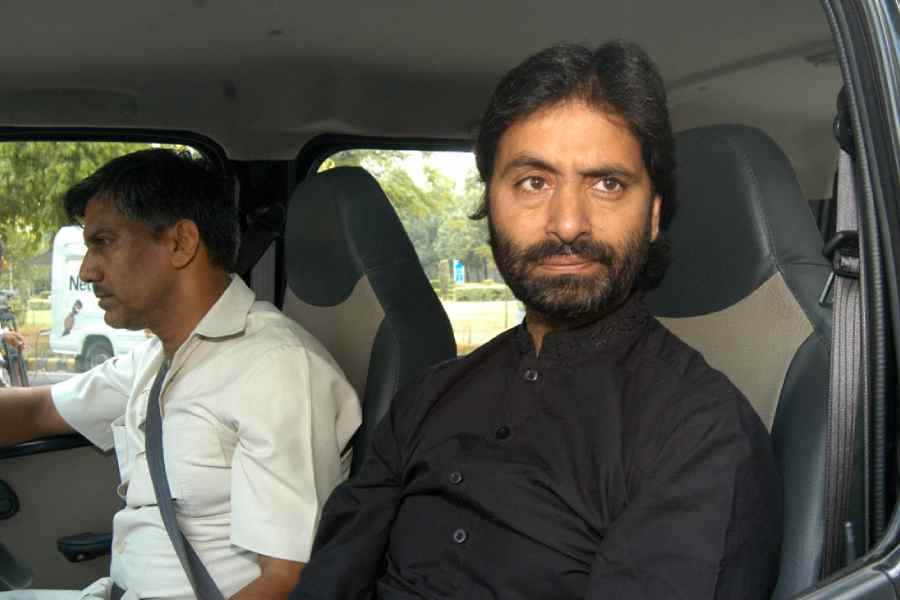Trouble has mounted for jailed Jammu and Kashmir Liberation Front chief Yasin Malik, facing trial in the high-profile killings of IAF personnel in Srinagar in 1990, after an eyewitness identified him as a shooter in the case.
Four IAF personnel were killed and nearly two dozen injured in a daylight militant attack in January 1990, months after militancy broke out here.
CBI senior public prosecutor Monika Kohli on Thursday told reporters that a prosecution witness had identified Malik as a shooter, calling it an important development.
Former IAF corporal Rajwar Umeshwar Singh, who survived the attack, on Thursday pointed to Malik in the courtroom as the main shooter.
Malik attended the court proceedings via videoconferencing from Delhi's Tihar Jail.
On January 25, 1990, squadron leader Ravi Khanna and three others were waiting for their pickup to the old Srinagar airfield for duty when they came under fire from militants.
The CBI filed a chargesheet in August 1990 against Malik and five others before a designated TADA court in Jammu.
In 2019, Delhi reopened two major cases against Malik including the 1990 IAF killings and the 1989 abduction of Rubaiya Sayeed, daughter of then Union home minister Mufti Mohammad Sayeed.
There had been no real progress in these cases for nearly three decades. The cases were pushed into cold storage by successive Congress and BJP-led governments at the Centre to facilitate talks with the separatists and Pakistan.
In 2020, charges were framed against Malik and six others in the 1990 IAF killings. Malik faced another setback in 2022 after Rubaiya Sayeed identified him as her abductor.
Malik was last arrested in a 2017 terror funding case — for which he is already facing life imprisonment — in April 2019 in the run-up to the scrapping of Jammu and Kashmir's special status.
The JKLF chief is believed to have borne the brunt of Delhi's crackdown on separatists for his role in the 2016 pro-azadi agitation that had followed the killing of Hizb commander Burhan Wani.
The imprisoned separatist leader had in 2022 resorted to a "fast unto death" in Tihar jail against what he called the violent State suppression in Kashmir and the alleged denial of a fair trial to him.
Malik ended his fast after the authorities reportedly agreed to some of his demands.
Malik had authored an eight-page "will" while in jail, giving details of his transition from a "non-violent activist" for azadi in 1986 to picking up arms in 1988 and his return to non-violent methods in 1994. He had handed the document over to his mother who later presented it before the media.
Malik and some of his colleagues had started the armed struggle in Kashmir.
The JKLF chairman has in the “will” recalled how he was “pressed” to start a “non-violent” struggle in 1994 while in jail by people in power at the Centre as well as the US and British diplomats on the condition that Delhi would allow a “genuine political space” and resolve the Kashmir issue “through meaningful dialogue”.
He has also written that after his release in 1994, he renounced violence by announcing a ceasefire and was “publicly declared a traitor” in Kashmir for doing that.
According to Malik’s “will”, the cases under the then anti-terror law TADA against him and five others were subsequently not pursued by governments led by P.V. Narasimha Rao, H.D. Deve Gowda, I.K. Gujral, A.B. Vajpayee, Manmohan Singh and Narendra Modi in his first term.










